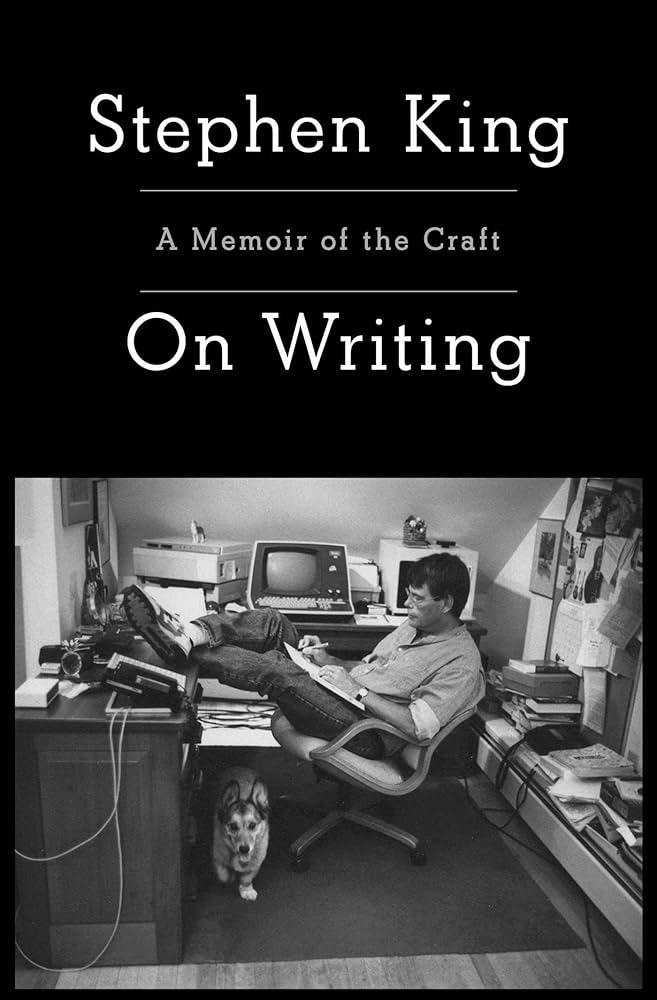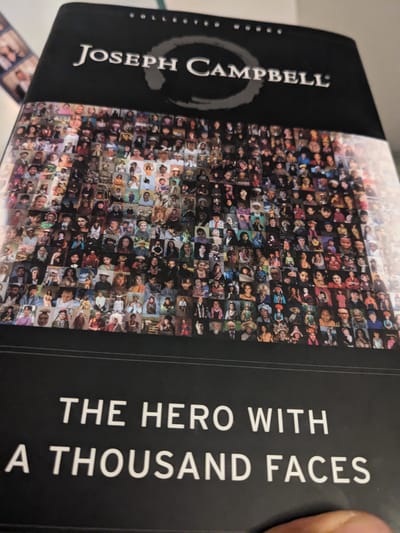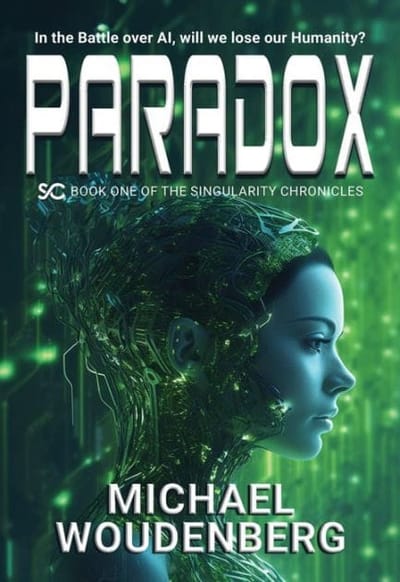On Writing

Jul 1 - Complete
Afterthoughts
What books should I read to get better at writing?
Anytime I wondered about or encountered this question online, this book On Writing was near (or at) the top of the list.
After completing it, I understand why.
King's memoir is not only a meta-master class from one of the fiction heavyweights of the twentieth and twenty-first century, it is also a story of grit, perseverance, and dedication to the craft of writing.
I now willfully join the chorus of writers recommending the work.
But it didn't start out that way...
King's style
It's been awhile since I've read any of King's fiction. The last novel I read was the (in my opinion average) Cell. That was way back in 2006 or 07 when I somehow had time to squeeze some casual reading in between my grueling college studies.
His fiction is well-known for good reason. Rock-solid characters, interesting stories, and imaginative scenarios color all of his tales.
But when it comes to non-fiction it's a different story.
I started reading On Writing two years ago in the summer of 2022. I skimmed the intro -shame on me- but couldn't understand why it was so highly recommended.
Why?
I didn't see any writing advice.
In fact, the first twenty to twenty five percent of the book is basically his memoir. His childhood, first attempts and money he made writing, high school, college, marriage, blah, blah, blah. Is it interesting? Mildly. Even with King's writing experience it seemed hard to dress the dog up.
Also, it took me some time to get used to his writing voice.
It borders on arrogance and snark. Two characteristics I have difficulty absorbing in any form of media for too long. But after awhile, I got with it and began to discover the secret behind the book's popularity and King's success.
What was it?
His passion for the craft.
Once I saw it -felt it- the entire book came into focus for me. Then I was ready to absorb the lessons from one of the masters of fiction.
Simply put, I don't think I've encountered anyone alive with as much passion for ordering words into stories.
This especially stand-out after spending so much time on social media for the last two years.
For many online hustlers and grifters, writing is a means to an end. It's how you grow your socials, sell more stuff, or make more connections. But writing for the love shaping words, worlds, and wonders of the imagination? Yeah, that's for suckers. An effort best outsourced to carefully engineered templates or pure (hollow) AI word generation. Save time, be more productive, templatize, optimize, how you gonna get paid if you don't?
This is not the case for King.
Is it about the money, honey? King answers, no. He writes for the thrill of the hunt for those not-so-perfect phrases. The writing process is the means to provide pleasure for himself and his readers.
Though I acknowledge that it's probably easy for a millionaire famous writer to say this and quickly dismiss his claim, I believe him. It's hard not to after reading the gems he offers in this book.
Your Writing Toolkit
When I reached the actual On Writing portion of the book, I was again surprised. I expected a lengthy lecture on the nuts and bolts of putting novels together.
What I got was more like guided suggestions instead of a construction manual. There were no, step-by-steps or walkthroughs. No drills or exercises; only Karate Kid style wax on wax off "movements" and "here's what worked for me's" to get you doing the two most important things a serious fiction writer should do daily: reading (books) and writing.
These are the two biggest lessons I took away from the book.
While the parts diving into description, dialogue, narration, and plotting (or excavating as King's analogy goes) were helpful, it's ultimately those two things that have made the biggest difference in his career.
And I've already seen the difference in my own writing.
For the past 42-days I've written a new draft chapter of my current manuscript, a supernatural horror novel about a high school teacher and a group of students fighting demons in Okinawa, Japan called "Gates of Okinawa."
In that time, I've also made a concerted effort to read at least a page--though I try for a chapter--of fiction and non-fiction daily. It's been a game changer.
Something happens when you read everyday.
You're not only soaking up vocabulary, grammar, and interesting situations (key components of King's fiction toolbox), but you're also subconsciously snatching up instruments to do your own work more and better.
Motivation, inspiration, drive to go back to your own work goes a long way in the realm of fiction writing where self-doubt, procrastination, and all other manner of excuses seek to pull you from your story every second.
When I read, I'm motivated to write. It also helps the writing I need to do come more easily. The virtuous cycle spins on and on.
While writing my first novel Cereus & Limnic back in 2019 and 2020, I battled to get 500 words on the screen a day. I was writing regularly, but I wasn't reading. I was doing the equivalent of working out, but not getting enough nutrition intake.
Now things are different. During the last 42 days I average 900 to 1000 a day.
Like an athlete, my endurance has increased. Writing and reading daily helps with that.
Notes on the Business
The sections on the business of writing were admittedly a little dated. It took me sometime to realize this book was written between 1997 and 1999. It had its first run in 2000.
Nearly twenty-five years ago the commercial internet--that now dominates our lives--wasn't even a decade old and I was still selling ads for my paper-based high school newspaper door to door.
That said, I think if you're just starting out, you'll still find the philosophy of things like getting an agent, King's opinion on writing workshops (generally a waste of time), and revision, helpful.
His 'Formula' for revision is something I plan to adopt.
Second draft = First draft - 10%
Accident and Inspiration
The second to the last part of the book finds King describing his near fatal accident when a distracted drive ran over him with a van.
His story nearly had me in tears. It's an emotional recount of the horror of his injuries, recovery, and his fight to find the words to finish this book On Writing and reconnect with his gift. It's powerful stuff. The raw vulnerability is impossible to ignore.
In fact, he's open and honest about many of his flaws in this book like any author of a good memoir should be.
Alcoholism, drug abuse, nearly losing his marriage, then later, his life are all parts of the narrative that King details with vivid prose and a healthy sense of humor. Through it all, it was the magic of writing (and his loving wife) that helped him overcome and reach unfathomable levels of success.
These stories were a reminder that getting thoughts on the page is not always the hardest thing. The circumstances surrounding your ability to do the job, whether they're physical, psychological, or circumstantial also play a part.
That's where his love of the craft comes in. Because only if you love it (almost can't live without it) will you show up when you're in pain, your computer goes bust or gets jacked, you got nothin' to give, or when your bank account has nothing but your name in it.
How do you become a legendary writer?
I don't know the exact answer for you. But reading (books) and writing everyday is a good way to bend the odds of even moderate success in your favor.
Writing = Telepathy
King considers writing a form of telepathy. You write down ideas and stories directly from your head to transmit to someone else's at some unknown point in the distant future. I'd never thought about it that way before, but that's exactly what it is.
I told my brother about this. He said he would meditate on it because it was a novel way to view something that he and I do everyday.
I'll add my own twist to King's thought:
The more telepathic signals you transmit and receive by writing and reading, the stronger (and clearer) your telekinesis will be.
Time to go make more magic.
Jun 28 - "What are you going to write about? Anything you damn well want. Anything at all... as long as you tell the truth."
Stories are: narration (move the plot), description (sensory details), dialogue
Begin with situation (do less plotting)
No spam, no sharing to third party. Only you and me.




Member discussion